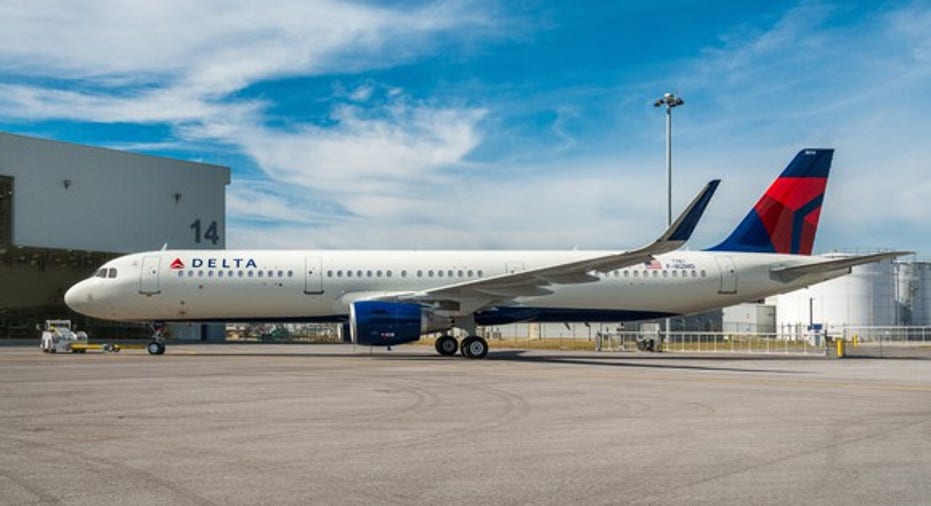Delta Air Lines Reverses Course in Cincinnati

For more than a decade, Delta Air Lines (NYSE: DAL) has been shrinking in Cincinnati. Even on the busiest days, Delta now operates fewer than 100 daily departures there, down from about 600 daily departures in 2005.
Recently, other airlines have started to take advantage of Delta's downsizing in Cincinnati by growing in that market. This culminated with Southwest Airlines' (NYSE: LUV) announcement last month that it will start flying to Cincinnati in June. As a result, Delta is re-evaluating its position in Cincinnati and plans to start adding capacity again later this year.
Delta Air Lines plans to add some capacity in Cincinnati this summer. Image source: Delta Air Lines.
Competition starts to creep up
Since 2013, low-cost airlines have been moving into the Cincinnati market. Frontier Airlines was first, beginning service in May 2013. Its fellow ultra-low cost carrier Allegiant Travel entered the market less than a year later. Both carriers have grown almost continuously in Cincinnati since then.
This rapid expansion by Allegiant and Frontier has caused the average airfare in Cincinnati to decline dramatically in the past few years. However, those airlines primarily appeal to budget-conscious leisure travelers heading to vacation destinations. That's a very different part of the market than the business-travel segment that is Delta's bread and butter.
By contrast, Southwest Airlines is a much bigger threat. While the carrier got its start catering to leisure travelers, it has become a major player in the business travel market over the past decade or so.
Beginning on June 4, Southwest will offer five daily flights to Chicago and three daily flights to Baltimore/Washington, with connecting service available to nearly all of its more than 100 destinations. That alone won't lure too many business travelers away from Delta. However, if Southwest were to continue expanding in Cincinnati, it could eventually give Delta a run for its money.
Southwest has a proven ability to succeed in the business travel market. Image source: Southwest Airlines.
Delta tweaks its offerings
Delta Air Lines is responding to this potential threat by upgrading its service in Cincinnati. This summer, it will add extra flights to five key markets: Atlanta, Chicago, Houston, Orlando, and Toronto. It will also upgrade to larger planes for flights to Denver and Minneapolis and extend its seasonal service to Fort Myers and Seattle. Finally, Delta will improve its flight schedules for several other routes.
In total, these moves will increase Delta's capacity (as measured by seat count) in Cincinnati by about 6%. It will also raise the percentage of flights with first class seats to more than 75%.
That's a big deal when it comes to keeping business travelers' loyalty. Historically, Delta Air Lines operated legions of 50-seat jets in Cincinnati. These planes have gone out of favor in recent years because they are cramped and don't have first class sections. (Many of them also lack Wi-Fi access.) They certainly can't compare to a Southwest Airlines Boeing 737 in terms of comfort.
By contrast, as Delta moves more of its service to mainline planes and large regional jets, it will be able to offer more amenities. The ability to upgrade to a first class or extra-legroom seat is an important way that Delta can differentiate itself from all-coach Southwest Airlines in the eyes of business travelers.
A smart pre-emptive move
Delta certainly isn't flooding the Cincinnati market with too much capacity. A 6% increase in seats shouldn't have any major adverse effects on pricing. Meanwhile, on the positive side, it will improve comfort and convenience for business travelers going forward.
While Cincinnati will never reclaim its prior position as one of Delta's biggest hubs, it is still an important market for the company. To stay profitable there, Delta must maintain its grip on the local business travel market. A little bit of extra capacity deployed appropriately could go a long way toward fending off the threat from Southwest Airlines.
10 stocks we like better than Delta Air Lines When investing geniuses David and Tom Gardner have a stock tip, it can pay to listen. After all, the newsletter they have run for over a decade, Motley Fool Stock Advisor, has tripled the market.*
David and Tom just revealed what they believe are the 10 best stocks for investors to buy right now... and Delta Air Lines wasn't one of them! That's right -- they think these 10 stocks are even better buys.
Click here to learn about these picks!
*Stock Advisor returns as of January 4, 2017
Adam Levine-Weinberg owns shares of Boeing and Delta Air Lines. The Motley Fool has no position in any of the stocks mentioned. The Motley Fool has a disclosure policy.



















